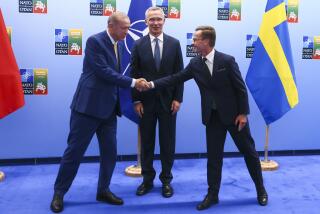Turkish Cypriot Parties Seek to Reunite Island
- Share via
ANKARA, Turkey — Two Turkish Cypriot parties agreed Sunday to form a coalition government that is committed to reaching a deal to reunite Cyprus before the divided Mediterranean island joins the European Union on May 1.
The pact could markedly boost Turkey’s chances of joining the EU as well. Leaders of the organization have made it clear that Turkey can’t qualify for membership negotiations until the resumption of U.N.-sponsored peace talks between Cyprus’ Greek majority and the breakaway Turkish republic of northern Cyprus, which is recognized only by Turkey.
As for Cyprus itself, EU benefits will apply only to Greek Cypriots as long as the island remains divided.
International pressure has been mounting on Turkish Prime Minister Recep Tayyip Erdogan to lean on the Turkish Cypriots to approve the United Nations’ latest peace plan.
In December, President Bush wrote to Erdogan urging him to “make history” with an accord based on the U.N. plan before May, one that could be “celebrated” when Bush and fellow leaders of North Atlantic Treaty Organization states meet for their annual summit in Turkey’s commercial capital, Istanbul, in June.
Erdogan is scheduled to meet with Bush and U.N. Secretary-General Kofi Annan at the end of January on his first official visit to the United States since assuming power in March.
“The sort of welcome he gets will very much depend on the sort of news he delivers on Cyprus,” said a senior EU diplomat, who asked not to be identified by name. “The key is to prove that Turkey is serious about doing a deal, to ensure that the Greeks [Cypriots], not they [the Turks], get blamed if the peace talks fail this time.”
Sunday’s breakthrough came after Erdogan intervened personally last week, bringing the two Turkish Cypriot parties together after a long deadlock following elections Dec. 14. The voting had left the Turkish Cypriot parliament evenly split between two blocs of parties, one supporting the U.N. plan and the other opposed.
The new coalition government will be led by Mehmet Ali Talat, leader of the left-leaning Republican Turkish Party, which campaigned on a pro-EU and reunification platform. On Sunday, he reiterated his commitment to those goals.
“I am hopeful that our government can revive the [U.N.-brokered] peace talks with the Greek Cypriots in time for a deal to be struck by May 1,” Talat said in a phone interview.
As leader of the party that received the greatest share of the vote, Talat was asked to try to form a new government nearly a month ago. But it took Erdogan’s intervention to broker the deal with Serdar Denktash, the leader of a small right-wing group.
“Erdogan telephoned them both on Tuesday, told them to come to Ankara on Thursday and asked them to come up with a coalition deal by Saturday,” said a Turkish Cypriot source close to the negotiations, who spoke on condition of anonymity.
The deal, cemented only a day after Erdogan’s deadline, was remarkable for several reasons.
For one, Turkish military leaders have been quietly pressuring Denktash not to share power with Talat. Many of Turkey’s generals, who have seized power three times in the last 44 years, are fiercely opposed to the U.N. plan. Under it, 35,000 Turkish troops, stationed in northern Cyprus since Turkey invaded in 1974 in response to a coup mounted by Greek Cypriots seeking union with Greece, would eventually have to withdraw.
Turkish military leaders, whose influence over Turkish politics would be diluted should Turkey join the EU, argue that Cyprus is too strategic a prize to be relinquished.
Erdogan’s success in brokering Sunday’s agreement was all the more impressive for bringing together Talat and Denktash. Serdar is the son of Rauf R. Denktash, the obdurate Turkish Cypriot leader who has led peace talks on behalf of his community for the past three decades.
The elder Denktash rejected the U.N. plan in March, labeling it a “diabolical” scheme aimed at reinstating Greek hegemony over the island.
His son also had opposed the U.N. plan but recently has adopted a more pragmatic stance.
“My father did not look too warmly on my forming a government with Talat,” Serdar Denktash acknowledged Sunday in a telephone interview from Nicosia, Cyprus’ capital. “Father-son relationship is one thing, politics is another. I am doing this in the best interests of the Turkish Cypriots, in the best interests of Turkey.”
More to Read
Sign up for Essential California
The most important California stories and recommendations in your inbox every morning.
You may occasionally receive promotional content from the Los Angeles Times.













